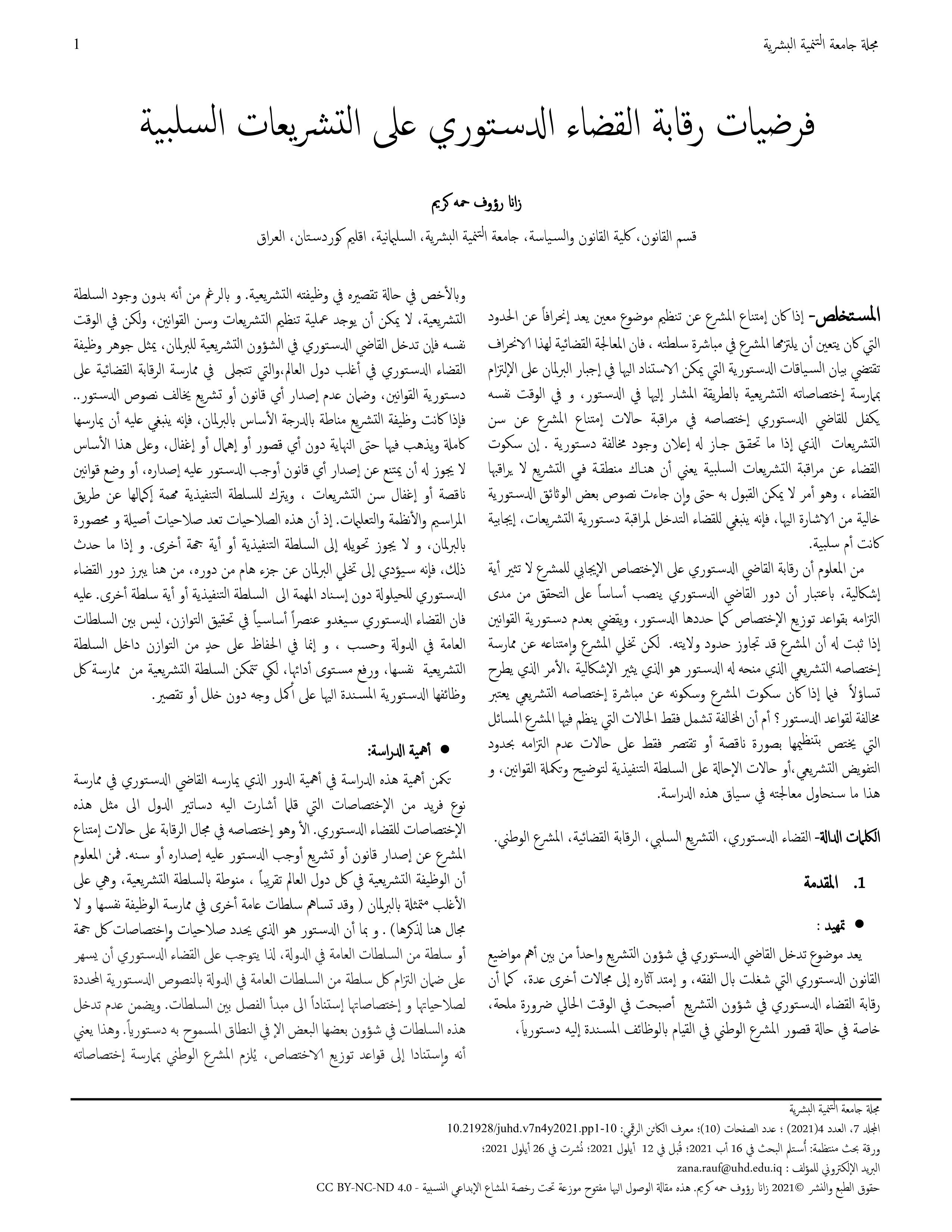Hypotheses of the constitutional judiciary’s oversight of negative legislation
DOI:
https://doi.org/10.21928/juhd.v7n4y2021.pp1-10Keywords:
Constitutional judiciary, negative legislation, judicial oversight, national legislatureAbstract
If the legislator’s refusal to organize a specific subject is considered a deviation from the limits that the legislator should have adhered to in exercising his authority, the judicial treatment of this deviation requires a statement of the constitutional contexts that can be relied upon to compel Parliament to commit to exercising its legislative powers in the manner referred to in the Constitution, and At the same time, the constitutional judge is guaranteed his competence to monitor cases of the legislator's failure to enact legislation, which, if achieved, may declare a constitutional violation.
The judiciary’s silence about monitoring negative legislation means that there is an area of legislation that is not monitored by the judiciary, which cannot be accepted even if the texts of some constitutional documents are devoid of reference to it. The judiciary should intervene to monitor the constitutionality of legislation, whether positive or negative.
It is known that the constitutional judge’s oversight of the positive jurisdiction of the legislator does not raise any problem, given that the role of the constitutional judge is mainly focused on verifying the extent of his commitment to the rules for distributing jurisdiction as defined by the Constitution, and it judges the unconstitutionality of laws if it is proven to him that the legislator has exceeded the limits of his mandate. But it is the legislator’s renunciation and refusal to exercise his legislative competence granted to him by the constitution that raises the problem, which raises the question whether the legislator’s silence and inactivity in exercising his legislative competence is considered a violation of the rules of the constitution?
Or does the violation include only cases in which the legislator regulates the issues that it is competent to organize in an incomplete way or is limited only to cases of non-compliance with the limits of the legislative mandate, or cases of referral to the executive authority to clarify and supplement the laws, and this is what we will try to address in the context of this study
References
- أولاً : الكتب :
د. إبراهيم محمد صالح الشرفاني، رقابة المحكمة الدستورية على السلطة التقديرية للمشرع، منشورات الحلبي الحقوقية، ٢٠١٦.
د. سعد جبار السوداني،القصور في الصياغة التشريعية، جامعة المستنصرية،٢٠١٢.
د. عوض المر، الرقابة القضائية على دستورية القوانين في ملامحها الرئيسية، مركز رينيه، جان ديوي للقانون والتنمية، مكان الطبع و سنة الطبع بلا.
د. مازن ليلو راضي، د. زانا رؤوف حمه كريم، د. دانا عبدالكريم سعيد، القضاء الإداري، مطبعة يادكار، السليمانية ،٢٠٢٠.
د. محمد ماهر أبو العينين : الانحراف التشريعي والرقابة على دستوريته ، دراسة تطبيقية في مصر ، ج١- ج٢ ، دار أبو المجد ، القاهرة ، ٢٠٠٦.
- ثانياً : البحوث والدراسات :
بالجيلايلي خالد، الإختصاص السلبي للمشرع والرقابة الدستورية عليه، مجلة الأستاذ الباحث للدراسات القانونية والسياسية، العدد السادس،٢٠١٧.
حيدر محمد حسن، معالجة فشل البرلمان في ممارسة الاختصاص التشريعي في القانون الإيجابي، مجلة المحقق الحلي للعلوم القانونية والسياسية ، العدد الرابع ، السنة السابعة، ٢٠١٥.
د. زانا رؤوف حمه كريم، رهانات العدالة الدستورية في العراق، مجلة دراسات قانونية و سياسية، جامعة السليمانية، السنة السابعة، العدد ٢، ٢٠١٩.
د. صالح عبد عايد، وقف تنفيذ القرار الإداري السلبي، مجلة كلية الحقوق، جامعة النهرين، المجلد ١٩ ن العدد A١ .٢٠١٧.
د. محمد حسين المجالي، التحليل القانوني للقرار الإداري السلبي ومدى جواز وقف تنفيذه، مجلة الجامعة الإسلامية للدراسات الشرعية والقانونية، المجلد ٢٨ ، العدد ٢، ٢٠٢٠.
- ثالثاً: الرسائل الجامعية:
سامر عبد الحميد محمد العوضي، "أوجه عدم دستورية القوانين في النظام الأمريكي والماري، دراسة مقارنة"، أطروحة دكتوراه، كلية الحقوق، جامعة الإسكندرية، ٢٠٠٨.
شالآو صباح عبدالرحمن، تدرج القواعد الدستورية- دراسة تحليلية مقارنة للدساتير العراقية، أطروحة دكتوراه، جامعة السليمانية، ٢٠١٨.
علي العرادي، مبدأ التناسب في التشريع والرقابة على دستوريته، رسالة ماجستير، كلية الحقوق، جامعة البحرين، ٢٠١٤.
مريم ماجد حمد صالح، أثر القصور الدستوري على حماية حقوق الإنسان، رسالة ماجستير،كلية الحقوق ، جامعة النهرين،٢٠١٨.
- رابعاً : البحوث والدراسات على المواقع الإلكترونية :
أحمد طلال عبدالحميد، السلطة التقديرية للمشرع العراقي في ضوء الدستور و قرارات المحكمة الإتحادية العليا، الحوار المتمدن، متاح على الرابط الإلكتروني الآتي:
( تأريخ الزيارة ١/٩/٢٠٢١) :-
https://www.ahewar.org/debat/show.art.asp?aid=715618
عيد احمد الغفلول، فكرة عدم الاختصاص السلبي للمشرع (دراسة مقارنة)، متاح على الرابط الإلكتروني الآتي: (تأريخ الزيارة ١ / ٦ / ٢٠٢١)https://www.amazon.fr
د. علاء إبراهيم محمود الحسيني ، رقابة المحكمة الإتحادية العليا لإمتناع المشرع في العراق عن القيام بواجباته الدستورية، متاح على موقع شبكة النبأ على الرابط الإلكتروني الآتي ( تأريخ الزيارة 1/6/2021).https://annabaa.org/arabic/rights/24857
د. عصام سليمان، العلاقة بين القضاء الدستوري والبرلمان، بحث متاح على الرلابط الإلكتروني الآتي :
https://constitutionnet.org/vl/item/allaqt-byn-alqda-aldstwry-walbrlman
د.علاء إبراهيم محمود الحسيني، رقابة المحكمة الاتحادية العليا لامتناع المشرع في العراق عن القيام بوجباته الدستورية، شبكة النبأ المعلوماتية، متاح على الرابط الإلكتروني الآتي :
https://m.annabaa.org/arabic/rights/24857
د. عبدالعزيز سالمان، الرقابة القضائية على قصور التنظيم التشريعي، دراسة متاحة على الرابط الإلكتروني الآتي ( تأريخ الزيارة ١/٩/٢٠٢١ )
https://manshurat.org/node/66837
فارس حامد عبدالكريم، القصور التشريعي- بحث في فلسفة القانون الوضعي، مؤسسة النور للثقافة والإعلام، متاح على الرابط الإلكتروني الآتي : http://www.alnoor.se/article.asp?id=42776

Downloads
Published
How to Cite
Issue
Section
License
Copyright (c) 2021 Zana Rauf Hama

This work is licensed under a Creative Commons Attribution-NonCommercial-NoDerivatives 4.0 International License.


